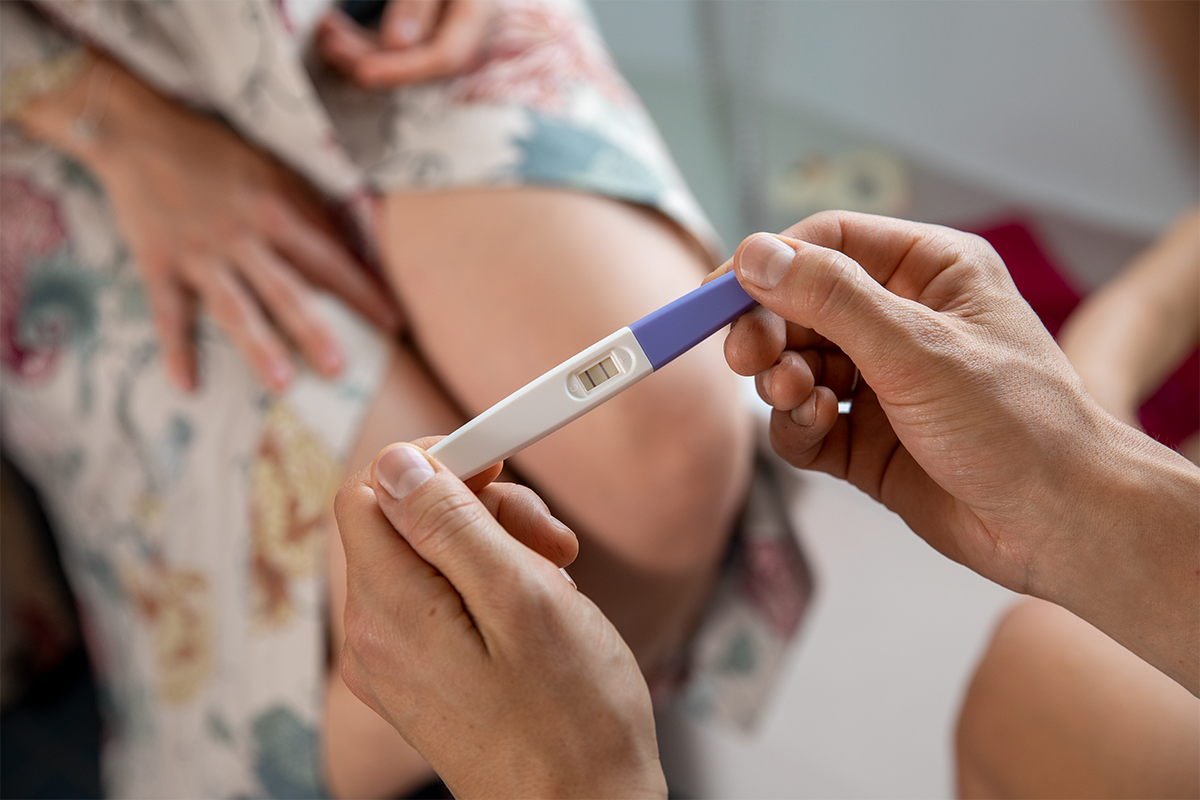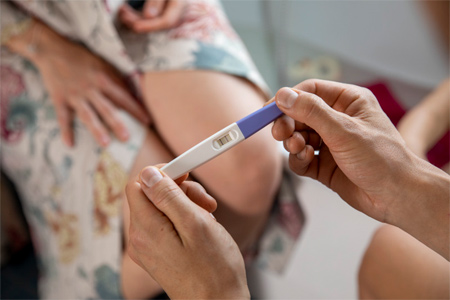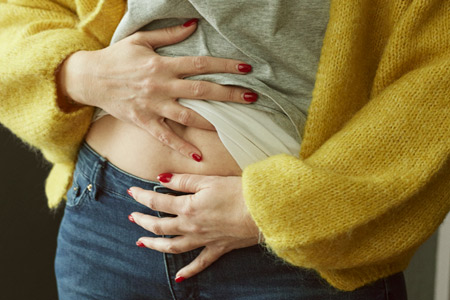Everything you need to know about ovulation

How can you work out when ovulation occurs, and how does it impact the chance of getting pregnant? In this article we help you recognise the symptoms and signs of ovulation.
Once a month (usually), a hormonal change takes place in the female body that causes an ovary to release an egg. This is called ovulation, and this seemingly minor event is decisive in relation to whether or not you will get pregnant. However, there are more fertile days – in other words, days on which you can actually get pregnant – than just the actual day of ovulation.
When does ovulation occur?
Ovulation usually occurs around two weeks before you get your period, although the timing is not always constant, and it is not unusual for ovulation to occur between 12–16 days prior to your period. In other words, it is not easy to determine the exact day of ovulation with certainty. Furthermore, your menstrual cycle can vary from month to month, which makes the whole thing even more complicated. To gain an approximate idea of when you are ovulating, you can use one of the many apps or ovulation calendars that are available. But if you want to be a little more certain, you can buy an ovulation test (or fertility test, as it is often also called). Such ovulation tests work in much the same way as a pregnancy test: you urinate on a test stick to measure a hormone (LH) that surges in connection with ovulation.
Menstruation without ovulation
Regular periods are usually a clear sign that ovulation is occurring as it should, as a period is the result of an unfertilised egg. However, human beings don’t just lay an unfertilised egg in the style of a hen! Instead, the egg is destroyed inside the body and is then discharged, together with remnants from the lining of the uterus, in the form of bleeding. We call this menstruation, otherwise and perhaps more commonly referred to as a period. Sometimes, period-like bleeding occurs without there having been any ovulation, but this is not a “real” period – in such instances, both the bleeding itself and the missed ovulation are often due to low hormone (oestrogen) levels. This happens to many women from time to time and usually goes unnoticed, as it can easily be mistaken for a real period due to the similarity. However, a sign that you have not ovulated, despite bleeding, is often the fact that your “period” that month arrives late or otherwise differs from what your normal cycle usually looks like.
The chance of getting pregnant before or after ovulation
For anyone who wants to get pregnant, it is important to be aware that, while the egg itself – after it has been released – can be fertilised for 24 hours, the sperm can actually survive in the uterus for up to five days while waiting for the egg. In other words, your fertile days commence around 2–3 days prior to ovulation and last until a day or so after ovulation, although this can vary a little from person to person.
If, on the other hand, you want to work out when you are ovulating for the opposite reason – in other words, to identify your “safe days” – it is important to bear in mind that both your menstrual cycle and your day of ovulation can be irregular. This means that there are a number of uncertainties involved, and trying to identify and track your ovulation-related fertile days is therefore perhaps not an approach to recommend if you absolutely do not want to get pregnant!
Symptoms and signs of ovulation
So, are there any clear signs – apart from regular periods – that enable you to determine if you are ovulating? Although they may go unnoticed in some cases, the following are some common symptoms of ovulation:
- Changes in your cervical mucus
During ovulation, you can often see that your cervical mucus becomes clear, stretchy in texture and a little “slippery”, with a consistency similar to raw egg whites. The reason for the changes in your cervical mucus is actually a touch of ingenuity on the part of your body, as this enables sperm to survive and swim to the egg more easily. You can also check for ovulation by checking the consistency of the mucus with a finger. If it is slippery and a little stringy, it is likely that you are ovulating. It is a good idea to check this on several occasions during your menstrual cycle, so that you have several points of comparison. - Elevated body temperature
If you keep a close eye on your body temperature, you will notice that it usually rises by about half a degree during the 24-hour window after each ovulation. - Stomach pain
Some, although not all, women may experience stomach pain during ovulation. Relief from this type of ovulation pain is usually achieved with a wheat bag on the stomach or over-the-counter painkillers – but bear in mind that you should avoid painkillers with COX inhibitors if you are trying to conceive, as they can make it harder to get pregnant. If, however, you experience severe pain then you should contact a gynaecologist for advice and help. - Swollen stomach and breasts
Many women experience a general swelling in the body during ovulation – your stomach may feel bloated, and your breasts more dense and tender than usual. - Ovulation bleeding
Some women may experience light bleeding during ovulation due to a little blood or fluid coming from the ovarian follicle when the egg has been released. Ovulation bleeding only involves light bleeding and has the appearance of a brownish or pinkish discharge or a few drops of red blood. Experiencing this type of regular bleeding during ovulation is completely normal. If, however, you notice some new types of bleeding that feel unfamiliar compared with your earlier experiences, and which perhaps occur at other times in your menstrual cycle, you should always contact the healthcare service.
What happens in the female body during ovulation?
After menstruation, there is a surge in a hormone in the body (FSH) which affects the ovaries and causes the egg to mature inside its follicle in the ovary. While the egg is maturing, the ovaries increase the production of the female hormone oestrogen, which is what causes the changes in the cervical mucus that make it easier for sperm to pass through and survive in the mucus. The higher level of oestrogen also affects the pituitary gland which, via a hormone (LH), sends a signal to the ovaries that ovulation can begin. When the ovarian follicle ruptures, the egg is released and starts to work its way down towards the uterus. In some months, two eggs may be released, and if both are fertilised they will produce fraternal twins.
The ovarian follicle is then transformed into a small organ that produces hormones, including progesterone, which causes the lining of the uterus to grow and prepare to receive a fertilised egg. If nothing happens with the fertilisation of the egg, these are the remnants that are subsequently discharged from the body in the form of a period.
What types of factors can affect ovulation?
There are many things in life that can affect ovulation, and irregular or missed ovulation is a fairly common cause of involuntary infertility. While it is not always easy to know what is causing it, some common reasons for missed or irregular ovulation could include:
- Obesity or low body weight.
- Medicines may affect ovulation, such as certain painkillers (COX inhibitors) and testosterone supplements.
- Diseases and disorders, such as PCOS.
- Hormonal abnormalities or imbalances.
- Age often has an impact and makes ovulation more irregular.
- Very hard training or excessive exercise.
- Naturally, hormone-based contraceptives such as birth control pills have an effect on ovulation, as their area of application is exactly that, i.e. inhibiting ovulation.
If a fertility investigation leads to the discovery of problems with ovulation, there are prescription tablets available that are intended to stimulate ovulation.
Why can’t I get pregnant despite ovulation?
If you are doing your utmost to get pregnant, please be aware that ovulation is only one piece of the pregnancy puzzle. Without performing a fertility investigation, it is impossible to say why someone isn’t able to get pregnant, but it is important to know that involuntary infertility could just as well be due to other factors, such as problems with the fallopian tubes, or sperm that are simply not energetic enough. As you get older, your ovulation also becomes a little more unreliable due to the fact that you have fewer eggs and ovulation does not occur as often. However, this does not mean that you are not still fertile, but rather that, with age, it becomes more difficult to get the timing right, and you may need help to a greater extent in the form of assisted reproduction. Eventually, however, after menopause – when both menstruation and ovulation have stopped occurring – it is no longer possible to get pregnant.
Please note that all information above is based on Swedish recommendations.


